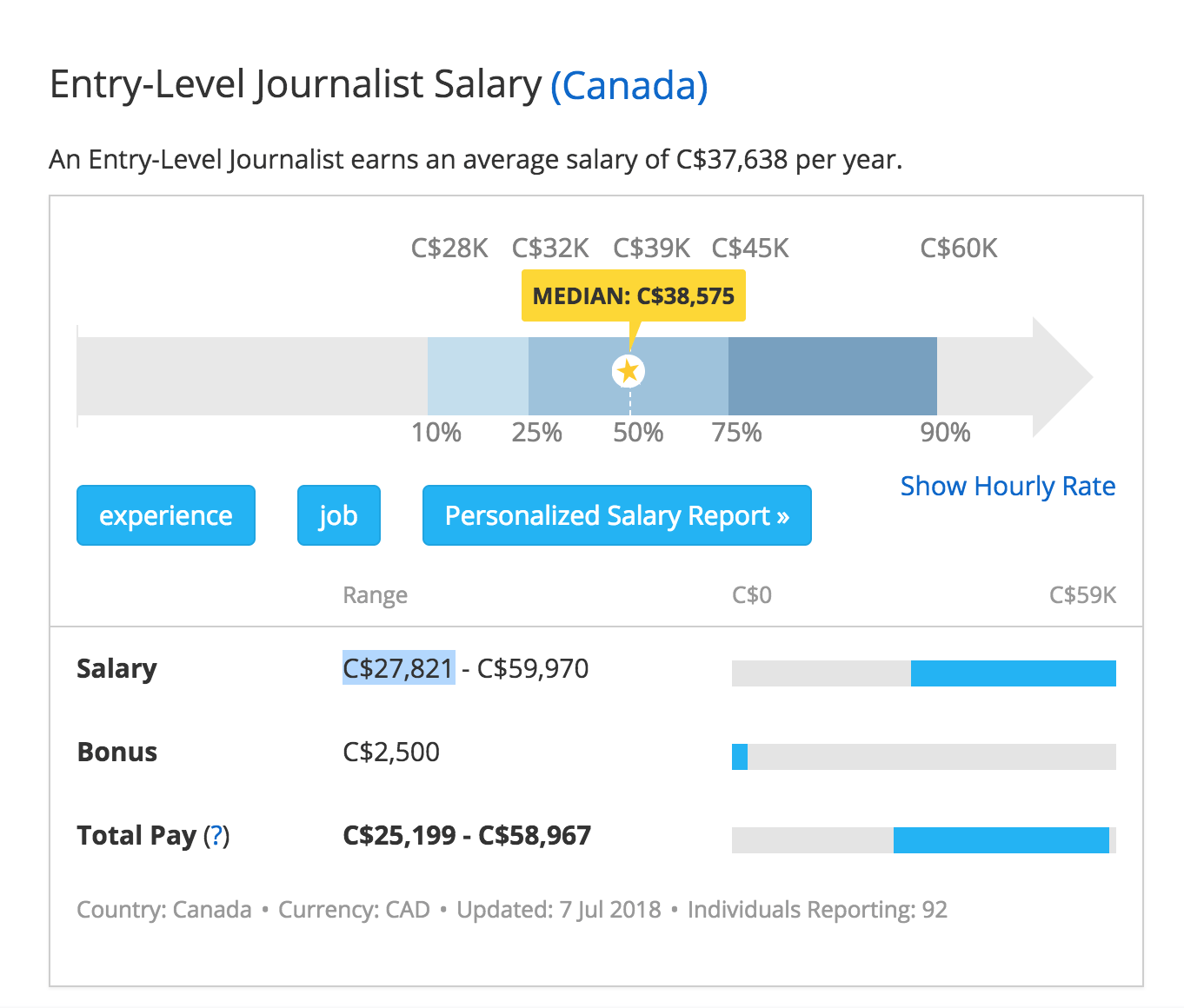The journalism major provides you with a series of core skills needed to become a media worker. So, what are the employment prospects of studying journalism in Canada? This article will give you an introduction to the major of journalism, employment prospects, college recommendations, professional skills taught, and the opinions of netizens and UtoCanada.

Introduction to the Canadian Journalism major
The journalism major provides you with a series of core skills needed to become a media worker, including researching, surveying, interviewing, reporting, writing, video editing, text editing, note-taking, audio recording, content management and web content development techniques. In addition, the skills taught in journalism include:
- Distinguishing reliable information sources;
- Use of software applications for editing audio, image, and video;
- Professional knowledge in research reports, topic writing or current affairs reports;
- Factual writing;
- Understanding of ethics and professional standards in news and reports;
- Filtering information;
- Conducting interviews;
- Creating broadcast stories;
Through the combination of theoretical study and practice, the journalism major aims to help you enter the field of journalism and media after graduation.
As the structure of the news industry shifts from print to digital, from offline to online, and from local to global, many journalism schools are currently undergoing a transition period.
Some schools’ curriculums focus on teaching students the basic skills (ie. writing, reporting and text editing), and integrate elements of online media into these traditional courses. However, some journalism schools are doing the opposite. They use online media as the basis of their journalism courses, and inject basic skills of writing, reporting and editing into online media courses.
》Areas of specialization in journalism
Although journalism majors may vary between schools, most curriculums allow you to choose courses that will help you develop in your chosen field, which may include:
- Targeting specific media/channels: such as websites, newspapers, magazines, brochures, social media or radio
- Targeting specific fields: such as sports, business, politics, technology or international news
- Specific skill sets: such as interviewing, writing, editing or online user development
Journalism Courses
》General Courses
Most journalism degree programs require students to take courses in fields other than journalism to ensure that they gain a set of comprehensive skills and knowledge. These courses may include various disciplines such as history, politics, psychology or economics. Some courses also require a certain amount of foreign language learning -- if you are considering a career in international journalism, this may be quite beneficial.
》Foundation Courses
Many undergraduates in journalism need to complete core foundation courses. This includes courses on the principles and history of journalism, ethics and diversity, editing and media law.
》Writing and Reporting Courses
Writing and reporting courses are essential to journalism majors. These can help you build basic skills such as time management, interview conduction, content development, and information recording, while also letting you understand the standards of the news industry. Most universities require basic writing courses, after which you can continue to improve your writing skills through advanced writing and reporting courses centred on more specific topics, including multimedia reporting, public relations writing or business reporting.
》Specialized Courses
Many undergraduate journalism courses (at universities such as Concordia University mentioned below) require you to focus on a specific field of journalism, such as sports journalism, photojournalism, or technology journalism.
》Internship, internship and graduate studies
Most journalism majors require you to take an internship. These internship positions will help you gain practical work experience in different media types. Whether it is forums, newsrooms, TV stations or radio stations, your internship experience will greatly affect your chances of gaining your first job opportunity after graduation.
Employment prospects for Canadian journalism graduates
Journalism degree programs can help you prepare for a career in journalism and media. Journalism is a fairly broad field. So, let's take a look at some specific careers that this degree prepares you for:
- Assistant editor
- Biographer, financial reporter, investigative reporter
- Book critic
- Broadcast reporter
- Columnist, film critic, music critic
- Court reporter
- News anchor
- News editor
- Sports reporter
- TV news reporter
》Job description of tech journalists/engineers (specific job description)
Some graduates do not choose to become journalists for various reason. They may decide to develop in other fields. The more common jobs are:
- Social Media Manager
- Publish Relationship
- Copywriter
- search engine optimization内容编写者 (SEO Content Writer)
- Community Manager
- Travel Blogger
- Network Writer
Journalism graduate salary: The decisive factors & annual income
Canadian salary:According to data from PayScale.com,the average salary of entry-level professional journalists is $37,638 per year.

》Three types of credentials: college diploma, undergraduate degree, and graduate degree
Traditionally, training in journalism can be obtained in three ways in Canada:
- College diploma:generally 2-3 years
- Bachelor’s degree:generally 4 years to complete
- Graduate degree:generally 2 years to complete
Top 10 schools for journalism in Canada
According toQS World University Rankings,the top 10 Canadian universities for media and journalism are:
Screenshot
Recommended schools:
》Ryerson University
The journalism undergraduate program at Ryerson University accepts 150 students each year for their four-year program. These future media workers prepare for employment through learning theory and practice. All students in the fourth year can choose to participate in an internship. Ryerson now offers a two-year master's degree program in journalism, possibly one of the most famous master's degrees in journalism in Canada.
》Carleton University
A lot of people online say that Carleton University’s journalism major is the best in Canada. The school's curriculum focuses on news and political news, and is known for its high withdrawal rate. Every year students with an average below B+ will be required to withdraw. In addition, the school also offers two master's programs: the practicum or internship option.
》UBC
Although UBC does not currently offer an undergraduate degree in journalism, it offers one of the best Master of Journalism program in the country. The UBC full-time graduate degree is a five-semester program, including a summer internship. Compared with other schools, UBC’s Journalism program has a smaller class size and gives students a lot of one-on-one attention so that students can gain more resources. This hands-on and academic approach prepares students for journalism and media careers.
》University of King’s College
University of King's College is located in Halifax, Nova Scotia. The school’s journalism major is a four-year program, which is very competitive, and has a heavy course load. Internships are compulsory in this major (we are giving this program a thumbs up!), so that students can familiarize themselves with a particular field of journalism in advance to pursuing a career. In addition, the school also offers a one-year postgraduate program.
》Concordia University
Concordia University, mainly located in Montreal, Quebec offers a three-year bachelor's degree program in journalism. The major itself has three different sub-fields to choose from, and students can choose according to their own interests. For more detailed information, you can check the university’s official website. In order to graduate successfully, students also need to have a working knowledge of French. The two-year master's program offered by the school is purely theoretical and not suitable for students who want to become professional journalists.
》圭尔夫大学-亨伯校区
The special feature of this major is that in addition to a degree in journalism, you can also get a Honours Bachelor of Applied Arts in Media Studies. The professional study includes five key areas: journalism, digital communications, public relations, visual communication and media business. In order to graduate, you will need to complete an internship of more than 200 hours.
》Western University
Three types of undergraduate journalism degrees are offered:
- Media, Information & Technoculture;
- Media Theory and Production;
- Media & the Public Interest
Western offers two collaborative programs withFanshawe College Each degree program offers a very diverse curriculum and a one-month compulsory internship.
》Centennial College
Centennial College offers students two majors in journalism, both of which have co-op opportunities. Students can choose a four-year joint degree program with the University of Toronto (UTSC), or receive a three-year college advanced diploma. Centennial also provides a two-year graduate program for university graduates and practicing journalists.
Summary: UtoCanada's views on the journalism major
》Basic information about the journalism major in Canada
If you want to know what skills and qualifications employers are looking for, you can refer to job advertisements sites like Job Bank or Indeed. Some of the skills currently described in job postings in various news media companies are:
- Multimedia storytelling skills: knowledge of how to make audio slides, shoot and edit videos and photos, and write for the web;
- Use of data and statistical techniques to tell a story: understand how to collect, edit, analyze and interpret data to generate compelling interactive graphics;
- Basic programming skills: ability to create compelling functional pages that attract and retain audiences;
- Media business skills: involving understanding how to help employers generate income without compromising ethics;
- Audience development skills: a set of marketing skills, including managing online communities, interpreting audience behavior data, crowdsourcing information, and interacting with audiences (such as responding to comments on articles).
Look at job descriptions in advance, and compare them with your own qualifications. You can develop these skills accordingly before graduation because skills cannot be acquired in a short time, so the earlier you prepare, the secure you are with your chances of getting employed.
》Choose a school with co-op opportunities
When looking for a job in Canada, compared with your educational background, employers generally value your skills and experience more. Therefore, make the most out of your summer vacation to do co-op or work in an internship position. These experiences are vital to finding a job after graduation. However, not all schools offer co-op or internship jobs for students. Therefore, when choosing a school, try to choose schools and programs that provide these opportunities.
》If you want to work in a Chinese media company after graduation…
In Canada, the more formally established Chinese media companies are basically concentrated in Vancouver and Toronto. For example, Sing Tao Daily, Canadian Chinese Radio, 51.ca, YorkBBS Forum, Ming Pao Newpaper, Toronto iAsk, VanPeople, Vansky, etc. When recruiting editor positions in these companies, they tend to prefer media majors or journalism majors.
These companies have high requirements for Chinese writing skills, so students will need to practice targeted skills before graduation.
》If you want to work in a western media company after graduation…
After all, reporters are literary workers, and the job itself requires a very high level of English proficiency. Interviews require good oral and listening English, news editors need to have good written English and good reading skills when investigating. Therefore, you should have a good foundation in English before entering a school.
In addition to having a good foundation before studying, you should work hard toimprove your English through various methodsand maintain a good habit of English reading and writing while studying in Canada.















